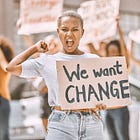This is part of a series. The links to prior pieces are at the bottom.
This will be a brief and tentative post. I had a kind of epiphany on the subject, about which I’m far from certain. This is after reading writers like
and and and and and many others.There will be some wild logical leaps and some generalizations and some assumptions here but I’m posting it in order to get feedback. I read
’s account of former Google engineer James Damore this morning:You might not recall his name, but you almost certainly remember his story.
Damore was the 28-year-old software engineer who, in August 2017, wrote a memo titled “Google’s Ideological Echo Chamber” in which he criticized his employer’s diversity policies, ideological homogeneity, and suppression of dissenting voices. The most controversial aspect of the memo was his explanation of the gender disparity among coders: He argued that it wasn’t merely bias that resulted in the underrepresentation of women in tech, but that men and women’s biological differences might play a role as well.
The memo went viral—and sparked a violent reaction among Damore’s Google colleagues. Said one: “You’re a misogynist and a terrible human. I will keep hounding you until one of us is fired. Fuck you.” Nearly every person in the country had an opinion on his memo.
Less than one month after Damore wrote it, he was fired. And, with the exception of a single, short-term stint at a start-up, he was banished from working in tech for eight years. “It became impossible to find a job,” he said. “Literally. I went to hundreds of places.”
Damore became one of the early victims of cancel culture, which reached its apotheosis in the summer of 2020 after the killing of George Floyd.
Damore was an early example of cancel culture, and an especially prominent case of collective feminine social aggression which found a scapegoat. Many Google employees used him to build their own status and satisfy their dark emotional urges. His paper, which laid out some reasonable conclusions based firmly in social science, was so upsetting to his coworkers (mostly female, from what I understand) that he was fired and has never been able to find work in the American tech world since.
Obviously such a reaction isn’t just, or pro-social. How could an entire company be weaponized against a single individual? Or, more likely, how could certain malcontents gain the illusion of unanimity among a workforce by threatening dissenters with reputational damage, and therefore weaponize one of the largest corporate bureaucracies on Earth?
Perhaps there is some kind of emergent property of masculine and feminine bureaucracies. No doubt women can work and contribute and thrive within a meritocratic hierarchy and no doubt many (perhaps even most) of them prefer to do so. But then, perhaps there’s a kind of shift when the regulatory functions (HR, legal, hiring, training) of a large organization are captured by emotional thinkers. Perhaps this shift empowers some of the most narcissistic and falsely vulnerable amongst them? Perhaps even in a field (like medicine) where women mostly just want to get the job done, when credentialing organizations and professional associations get taken over by women and progressives there’s a qualitative shift?
In group dynamics certain people gain outsized power. This is inevitable. In male hierarchies, concentrations of power can be due to variations in natural leadership and rank and status and (ideally) competency. Perhaps female hierarchies are so inherently different that the people who tend to rise in influence are passive aggressive, histrionic, and bullying. Perhaps the kindest and most reflective and most competent women in such organizations are sidelined, unwilling to play the dark status games which are (sometimes) required? Perhaps the mastery of coalition-building and social aggression mean that fundamentally different individuals rise in the 2 different kinds of organizations? Perhaps academia and Hollywood and the ABA (and a hundred other institutions) have been changed, not just through the promotion of different people and the centering of different values but through the invisible selections processes and status games which are inherent to all human hierarchies?
Naturally this is not the kind of thing that social scientists would be inclined to study, or that we’d be able to discuss. In a sense entire vast swathes of our society might have been captured by this malign dynamic.
Or am I crazy?
Feminism as Entitlement
(Coming soon: Romance & Mate Selection, The Myth of Female Achievement, Vulnerable Narcissism as a Political Program)









We have much to discuss…I’ve been thinking about this and several things around it. I do think women compete but based on beauty and status. Status is accrued by her own social and material capital, conferred by career, morality, friendships, and status of the mate. I also have a piece written but not fully edited about how James Damore was right that I was just thinking about publishing this coming week, and now I think the universe is telling me to. Having been in HR for a period, I can confirm that the population therein is most female and is generally the opposite of analytical. That is, dependent on people skills rather than anything that can be judged on the merits. The analytical women who end up in tech like I am now are fundamentally different from the women in communication oriented professions. At the same time, I’ve found I have an advantage as a woman in an analytical field over men because my communication skills give me an edge. But, I got here because I had a preference for exercising these skills, and while men did discourage me, they were all Indian. Women also discouraged me though, because they didn’t want me to be able to compete based on hard skills with men. The sabotaging of female coworkers is nothing short of making sure no woman rises above you, but it’s covert competition.
I had a 40 year career in Software Engineering. My entire working life was in male dominated, military oriented, hierarchical organisations.
I think that in western workplaces as they are currently structured (ie male hierarchies), when women come to occupy large parts of the hierarchy their female characteristics become liabilities.
In other words, and unsurprisingly, jamming women into male structured organisations, where the structures have arisen over centuries, doesn't work, at least a lot of the time.
Consider agreeableness. Men are much more disagreeaable than women. So when a man produces a bad idea, he'll generally be told outright by other men that it's a bad idea. In a healthy male hierarchy, bad ideas are aggressively filtered out.
Women, even if they think an idea is bad, will be more inclined to agree that it's a good idea. Those that don't agree risk running foul of the female group threats of cancellation and ostracism, and that's equivalent to death for a woman.
Taking Disney as an example, that's how you get the totally baffling destruction of vast amounts of valuable IP such as the now utterly ruined and valueless Star Wars and Raiders of the Lost Ark franchises. That's how you get the colossal debacle that is the new Snow White movie. How did these obviously shit products make it into the public domain? Its because on multiple occasions, too many people, fearful of being rejected by the group, nodded sagely when confronted with a pile of shit, and agreed that it was a pile of gold.
It would be interesting to see what a functional and effective female oriented organisational structure would look like.